 When God gives you a call, does He get right through? Or does He get a busy signal? Keeping the line clear takes work sometimes. Decluttering of noise, of distractions and desires and thoughts vying for our attention. Too often the urgent overtakes the critical. Spiritual triage falls forgotten in the wasteland of looming work deadlines and constant barrage of social media notifications. And our souls shrivel. But Busy Is Good! Western culture reveres "busyness" as the measure of success. The laws of supply and demand insist that the less time someone has for us, the more it is worth pursuing their attention. The heavier someone's workload, the better their skills must be. And the more exhausted we are chasing our version of a dream, the more applause we should earn. Because "busy is good!" But is it really? Our excuses make sense. I mean, especially in the entertainment and film industry, you gotta hustle. Gigs often present themselves at the last minute, requiring shoving everything else to the side in a sprint to prepare as best we can. Long days on set leave us with next to no energy to climb into bed, much less call a family member or stay awake for a few minutes of prayer. After wrap there is that confusing season of "set lag", where our bodies do their best to recalibrate immune systems and appetites and sleep cycles amid the inevitable catching up on a mountain of mundane chores. And if you are raising a family, that adds its own set of very valid priorities and pressures. We can't afford to take time for God. After all, we are busy serving Him! And yet, we can't afford not to. No Time To Chew Then, when we do make the time to take in a soul-nourishing Word, we often approach it like a task on our obese checklist rather than as a sanctuary of stillness from the rush. A friend shared their experience of diligently going through their daily Bible reading plan. Ten chapters: check. One day, while only on chapter two, they came across a few verses that captured their heart, but resisted the temptation to stop and dwell on them before completing their allotment of chapters. Temptation? Or invitation? They hadn't gotten too much farther before the Holy Spirit convicted them of basically telling Him to "shush until they were done." If we go to God's Word to hear Him speak, why would we treat His quickening of those words as an interruption? Yet I find I relate all too well.... To be clear, I'm not dissing reading plans. Regular meals are essential to spiritual health! But if we don't chew our food, and savor the taste and textures, we won't be digesting all the nutrients from it that we could, nor grow to anticipate the feast, if we are intent on swallowing portions whole. These are the Words of Life! Just because we have them readily accessible at any moment does not mean they are to be treasured less. For where our treasure is, there will our hearts be also. (see Matthew 6:21) Breaking The Cycle Listen, friends, we don't have to stay stuck in this crazy cycle. I know it's usually not our conscious choice to even be in it; it just "happens" and we get too caught up in the rat-race to notice. It's like if we get a headache, and rather than drink water to treat our dehydration, we pop a pill to mask the pain. But concealing the symptoms isn't a true solution! How do we transition to a lifestyle of valuing time with God and increase our sensitivity to His voice? One thing I know for sure, is that it doesn't happen by accident. Like with any relationship, intentionality is key for maintenance and growth. This is something I am working toward myself; I don't have all the answers, but I am "pressing on toward the goal." (see Philippians 3: 12-16) And if I were to articulate my New Year's resolution, it would be this: Pursue God's presence, heed His voice, and live how He loves. 1. Pursue God's Presence Unfortunately, the fact that God is omnipresent (present always and everywhere) doesn't automatically keep me from ignoring Him. I want to practice being more aware of Him with me, and do more of the things I know He takes pleasure in. This includes letting go of things I know are getting in the way of intimacy in my relationship with God. Choosing a verse to think on throughout my day, or getting a good truth-declaring song stuck in my head, are great ways to keep my focus in the right direction. 2. Heed His Voice Scripture tells us that God's voice is recognized by His sheep (that includes me!), so I don't need to worry about that. The harder part is being still to listen for the gentle whisper (see 1 Kings 19). It's not necessary to be in a quiet environment physically (although it certainly doesn't hurt, right?). Being still is more of an internal quieting and perking up of our heart to hear. To heed is to "take notice of and pay careful attention to." It carries a sense of alertness, mindfulness, and high regard for who or what you are heeding. So, to hear clearly I need to listen with a willing heart that is ready to joyfully obey! 3. Live How He Loves God loves purely and extravagantly and sacrificially. 1 Corinthians 13 is commonly called "the Love chapter" because of how thoroughly it explores the nature and power of the Love of God. The first letter the apostle John wrote (aptly titled 1 John) explores even deeper how this Love affects the way we should live. The "new commandment" Jesus gave us was to love as He has loved us (see John 13:34). Because of how He loves and restores me, I can reach out to others with that same unconditional, grace-filled, healing love. Whether we are raising kids, making movies, or spreading kindness to friends and strangers alike, that's to be the core of our life's mission: serving as His ambassadors of reconciliation to a broken, hurting world that He died to restore. And I never want to be too busy for that! And [Jesus] said, "He who has ears to hear, let him hear." - Mark 4:9
0 Comments
K.T. asks: “I've done some acting but never received my clips to make a demo real. What do I do when I am asked to submit one?” This is a common situation. Many aspiring actors are promised footage for their reel if they'll act for free in a student or other low-budget indie film, usually expressed as “copy & credit.” But that doesn't mean great clips are easy to come by. Some of those films never get finished, or won't release footage until their festival run is complete. In other cases, the footage is of such poor quality you risk cutting a reel that is worse than having no reel at all. So what are your options? 1) Face the facts First, realize that it is perfectly fine to own the fact that you don't have a reel. Some casting sites ask for demos with initial submissions (before the phase of sending out audition invites), but you can submit for most roles without one. CDs will still look at submissions without media attached (Actors Access, I'm looking at you). If asked for one specifically by a CD, explain that you do not have a reel available yet, and offer to record a clip of yourself doing a scene or monologue. It is NOT okay to send them a previous audition video, unless you have received written permission from the producers of that script. 2) Hunt down clips Look back at your talent/image release, deal memo, or contract (you do have one, I hope) to refresh yourself on the details of the promised footage. If the clips are indeed “due,” I would certainly contact the producers and respectfully request that they do what is necessary to fulfill their obligations. If they cite delays for a release, do your best to get a quote of when they expect the footage to be ready (and don't be afraid to negotiate). This won't always work, so be prepared for an unfavorable answer. I haven't gotten footage from my first role in a feature film, and probably never will, because my scene was cut along with several others during the assembly edit, and never got fully processed. 3) Produce your own! If you have the funds and the friends to do so, consider producing some scenes on your own. Better yet—make it an actual short film. That way you get an extra film credit to boot. Creating your own footage puts the burden on you, but also provides all the creative freedom to play the roles you want, exactly how you choose. Not a terrible trade-off. Do your best to get believable sets, costumes, props, good lighting, decent cinematography, good sound, etc. This is not the place for classroom theatrics. Mounting a full production isn't easy, but anything less is unlikely to get you quality footage. Demo Reel Tips & Trends If your acting blows me away, great. But I try to assume every actor can decently act unless I'm proven wrong (yeah, it's happened). The main thing I usually need from a reel is to hear and see you how you normally look and sound. And most CDs don't have the time or luxury to watch reels in their entirety. So for at least your first clip, don't showcase an acquired accent, or rely on heavily stylized or overly emotional footage. After the first 10 seconds, feel free to move on to the rest of your “range.” You don't need to put lines in context with long moments focused on your co-stars; keep the spotlight on you. A good length for a reel is between 1 and 3 minutes. If you really want to showcase more footage than that, try splitting it into Dramatic / Light-Comedic / Commercial genres. Another trend I've seen is having multiple “type” reels; I'd keep these short, 1 minute or less. In our digital world of online submissions, we aren't sending physical reels off to casting offices, so it makes sense to have more customization in reels. Just as many actors now do with their headshots, if you have more than one reel to choose from, you can send the one/s that best fit each particular casting situation. Happy editing! Got a question for me? Get in touch with me here, and I'll let you know when the answer is live on the blog!
This question is from G.C.: “As a casting director, what do you look for when you review auditions?” The casting director is on your team. They are rooting for each actor, hoping for them to blow their minds and be the obvious choice for a role. But it isn't often that easy. For one thing, casting directors are not the reigning monarchs of the casting process. If the director is “President” then they would be the member of their cabinet in charge of finding the best casting choices, and presenting/pitching them for approval or veto. Some “presidents” like to be more involved in that hunt than others. Sometimes other “cabinet members” are asked for their opinions, too. PLEASE NOTE: Much of the following will apply to live auditions as well, but will be phrased more specifically for taped submissions...which is getting more and more common anyway. With parameters from the script, budget, and the director's vision in mind, here are some of the top things we look for: 1) Instincts & intelligence Is the actor making bold, believable scene choices? Do they follow an appropriate and engaging arc for the character/scene? Are they using available space to play to the camera? In callbacks, does the actor understand and take direction well? 2) Appropriate physicality Does the actor's physicality (build, ethnicity/coloring, voice, mannerisms, etc.) fit the role? Does their essence / vibe / personality add or detract to the character being portrayed? If part of an on-screen family, or age-progressed character set, do they look related? Do they balance and/or add texture to the ensemble, in their acting style, energy, and look? 3) Professionalism Does the audition video have adequate lighting, sound, framing, background? Does the talent look like their headshot, or does their photo misrepresent them? Did the talent/agent submit the audition in a timely manner (and before the deadline)? Did the talent/agent follow all the instructions for the submission? 4) Adequate experience Do they have the confidence/maturity needed to pull off the role? Do they have the practical skills needed, or can they learn them in time? Do they have an existing affinity to a cause showcased in the film? Will they elevate the marketability or reach of the film? Most of the factors listed above are under some sphere of your control; others are not. If you don't get a callback, and can think of something you can do better or work on for next time—great! Learn from the experience and carry on. If you don't get a callback, and can't think of anything you would/could change, rest in the fact that you did your best and and carry on. At least you got on their radar, right? If you DO get a callback—congratulations! Unless instructed otherwise, keep as many of the presentation and portrayal choices you made in the initial audition. Do your thing, but remember to be flexible for unexpected direction, too. Happy auditioning! Got a question for me? Get in touch with me here, and I'll let you know when the answer is live on the blog!
I received a question recently from A.S.: “What are some acting exercises I can do at home?” First, I'd like to define what an acting exercise is: a process or activity that develops strength, dexterity, or skill in the art and craft of acting. That still covers a broad area, so now I want to break it up into two categories. I call them Targeted Training (like a workout routine) and Functional Training (think a general active lifestyle without going to the gym). For optimal “fitness” you'll want to incorporate some of each. There are tons of ways to target train, and most of these can be done solo or with a partner. Here are a just a few:
Functional Training relies more on your everyday life. You don't necessarily have to carve out a specific time and space, but it does require a level of intentionality:
One more bonus “exercise” for you: study Scripture like you would a script. Take a scene and break it down. Analyze the people (characters) in the passage, and what is going on (action). What is being said, and why? What is the subtext? Is there any cross-referencing to other “source material” you can do to construct a framework for the current moment in the story? The Bible is crammed full of amazing stories that really happened and people who really lived. Let them come alive to you! Happy exercising! :) Got a question for me? Get in touch with me here, and I'll let you know when the answer is live on the blog!
Hi Joey,
This is a great question! The answer is yes to both. Let me explain... “Everyone then who hears these words of mine and does them will be like
Social media revolves around sharing: photos, videos, quotes, thoughts, news, links, etc. One of the articles that caught my eye while scanning my feed this afternoon was "Why we are burning out in the arts." That to-the-point title caught my interest more effectively than 20 mind-numbing click-bait offerings. It's worth the read, and it got me thinking further on the subject.
As artists, our work is to create. Particularly in the film industry, while in the middle of a project, we are often dedicating 12 to 18 hours a day to our task! And because we are trained to sustain the long days, even when we need a respite, after a day or so it is tempting to feel guilty for not "working" in that moment. However, if we never take the time to recreate, our think-tank engine will soon be running on fumes. What do you do when the glass is neither half empty or half full...it's just...empty? Theories of how best to "land the role" are can be great and helpful and often very "clickable". That's not to say that they are effective for everyone (anyone?). Many are based on statistics and experience, others on mere conjecture. The following recollection is not meant to be fashioned into a formula, as a thread of events rarely repeats an exact pattern. Still, whether to satisfy simple curiosity, or to reassure irrational worries, perhaps it's constructive (if not always instructive) to share. So here is the story of "How I Got Cast In:" 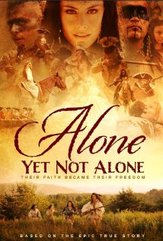 Now available on DVD! Now available on DVD! Alone Yet Not Alone This was my first full feature film experience, and my combined involvement in pre-production and production was a total of six months! In addition to my two older siblings, some of my very, very best friends now were fellow cast and crew on Alone. Shout out and hugs to all you wonderful people! :) Back in 2010, I was apprenticing with director George Escobar of Advent Film Group. Even before the project was officially green-lit, I was assisting with the screenplay revisions, proofreading, and breakdowns, etc. Because of my familiarity with the script and source material, as well as an expressed interest in acting, I was soon officially brought on within the casting department, given the responsibility of writing the full character profiles as well as assisting with the character descriptions in the breakdown. Finding an audition is easy; a simple Google search will turn up thousands. What's harder is finding one that's a good fit for YOU. It can be a daunting and never-ending task. It takes digging, and patience, and discernment, too (plenty of scams out there!). While it's not often a fast find, what it doesn't have to be is a mysterious process.  What are You looking for? All too often enthusiasm gets spent too soon in the audition room, and the first impression is wasted before the actor knows how to effectively communicate their strengths and their goals. Do you know which type of stories you are passionate about? Do you know where and how you'd best fit into them? Each project you are a part of is a part of your acting career, so it's worth it to find the ones that matter to you. Don't let the industry define you or shape you or bully you into what (you think) they think you should be. Be honest with yourself and embrace who God has and is making you to be. BE you. KNOW you. Write out as many varied descriptions of roles you know you could believably portray (in stories you'd have peace/joy about being in and representing), then condense them into different "types"; those are the character descriptions to look for in the breakdown. Here is a message I got recently: Hello Rebekah! So you want to act in Christian films? I heartily welcome you to the growing ranks! If you haven't done so yet, I'd suggest listening to the two interviews whose links are at the top of this page. They provide a good overview of how I got into acting, with some advice interwoven throughout for aspiring actors/actresses. My Top 10 Tips would boil down to:
Comment below if you have any questions, or have any tips you'd like to share! Also, don't forget that I offer individual actor coaching/mentoring, which you can apply for at any time. Stay tuned for my next post, about FINDING AUDITIONS. :) |
Archives
January 2018
Categories
All
|
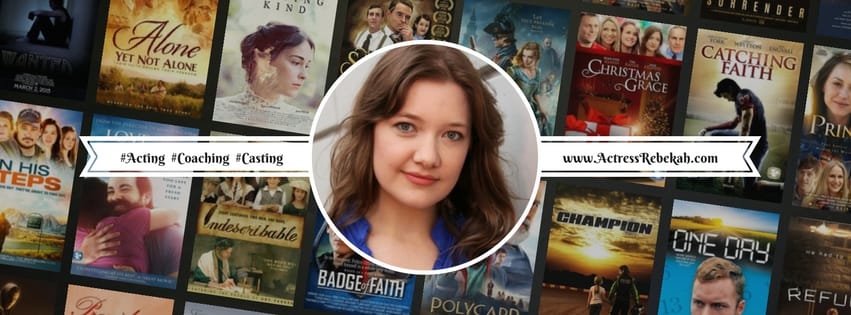
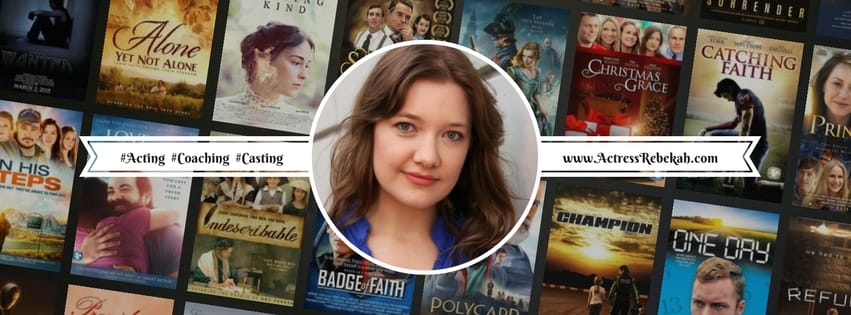
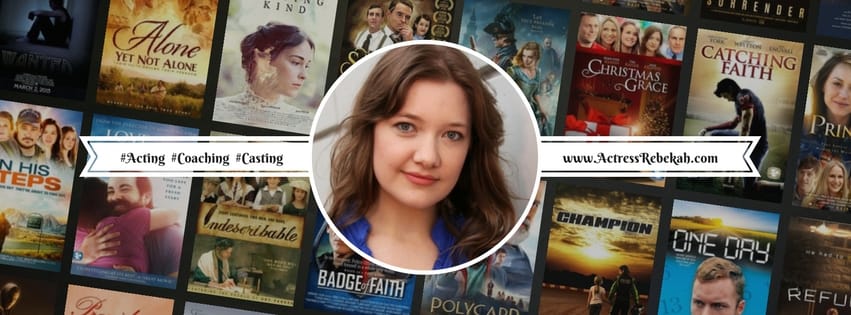



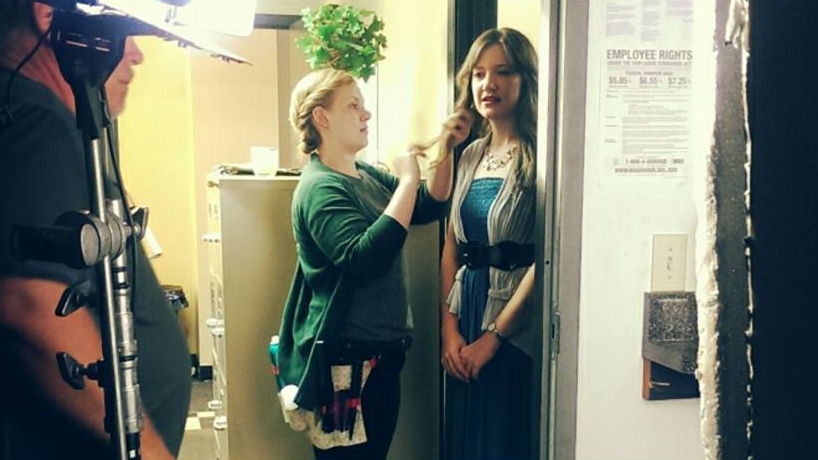

 RSS Feed
RSS Feed